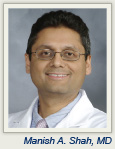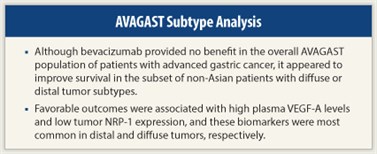 Subset analysis of the AVAGAST trial, which evaluated the benefit of bevacizumab (Avastin) in advanced gastric cancer, has demonstrated distinct differences in outcomes according to disease subtype, reported Manish A. Shah, MD, of Weill Cornell Medical College and New York Presbyterian Hospital, at the 2012 Gastrointestinal Cancers Symposium.1
Subset analysis of the AVAGAST trial, which evaluated the benefit of bevacizumab (Avastin) in advanced gastric cancer, has demonstrated distinct differences in outcomes according to disease subtype, reported Manish A. Shah, MD, of Weill Cornell Medical College and New York Presbyterian Hospital, at the 2012 Gastrointestinal Cancers Symposium.1
“In all geographic regions of the study, distal gastric cancer had a better prognosis than diffuse gastric cancer,” Dr. Shah noted.
“In clinical practice, gastric cancer is treated as a single disease. However, it appears to be more than one disease, and its subtypes have different prognoses,” he added.
Study Findings
AVAGAST was a global, randomized, phase III trial evaluating the efficacy of bevacizumab plus chemotherapy (capecitabine [Xeloda]/cisplatin) as first-line treatment for patients with advanced gastric cancer.1 The superiority of bevacizumab over placebo was not demonstrated (P = .1002), but regional differences were noted. In particular, patients from Europe and the Americas derived more benefit from bevacizumab than patients from the Asia-Pacific region.
“Several analyses have been performed to better understand the regional differences,” he said. These showed that Asia-Pacific patients had better outcomes, independent of other prognostic variables, and patients from Europe/Americas with one or more unfavorable prognostic factors derived a survival benefit from bevacizumab.2
 The current study (n = 773) examined survival data according to cancer subtype and region and examined the distribution of angiogenic biomarkers (plasma vascular endothelial growth factor [VEGF]-A and tumor markers neuropilin [NRP]-1, VEGF-A, VEGFR1, VEGFR2) across subtypes.
The current study (n = 773) examined survival data according to cancer subtype and region and examined the distribution of angiogenic biomarkers (plasma vascular endothelial growth factor [VEGF]-A and tumor markers neuropilin [NRP]-1, VEGF-A, VEGFR1, VEGFR2) across subtypes.
The subtypes were classified as proximal, nondiffuse (type 1); diffuse (type 2); and distal, nondiffuse (type 3). Type 2 gastric cancer (52% of study patients) was found to be more common than type 1 (10%) or type 3 (38%). Irrespective of treatment, patients with type 2 cancer had worse outcomes than those with type 3, with a median overall survival of 10.3 vs 11.7 months. Non-Asian patients had the most dismal prognosis, with a median overall survival of 8.0 vs 11.1 months in non-Asians.
A treatment effect with bevacizumab was also related to subtype. Non-Asian patients with type 2 and type 3 tumors (diffuse/distal) appeared to benefit most from the drug, achieving a median overall survival of 11.4 months with bevacizumab, compared with only 7.3 months with placebo, which was a 33% reduction in risk with bevacizumab, Dr. Shah noted.
“The addition of bevacizumab to chemotherapy especially appeared to improve outcomes in patients from Europe and the Americas with diffuse and distal gastric cancer,” he noted.
Differences in Biomarker Distribution
There also appeared to be differences in the pattern of biomarker expression among gastric cancer subtypes. In general, high plasma VEGF-A levels and low tumor NRP-1 levels were associated with treatment efficacy in AVAGAST.3 Plasma VEGF-A levels were highest in patients with type 3 tumors, and NRP-1 was lowest in patients with type 2 tumors.
Proximal (type 1) gastric cancer appears to have the “worst” profile for treatment with bevaciziumab, as it is generally associated with low levels of plasma VEGF-A and generally high expression of NRP-1. Patients with diffuse or distal (type 2 or 3) disease appear to have at least one biomarker that is supportive of a benefit from antiangiogenic therapy, Dr. Shah concluded.
“These candidate biomarkers, tumor NRP-1 and plasma pVEGF-A, provide a rationale for gastric cancer and/or subtype-specific outcomes with bevacizumab,” he suggested. ■
Disclosure: Dr. Shah reported no potential conflicts of interest.
References
1. Shah M, Van Cutsem E, Kang Y, et al: Survival analysis according to disease subtype in AVAGAST: First-line capecitabine and cisplatin plus bevacizumab or placebo in patients with advanced gastric cancer. 2012 Gastrointestinal Cancers Symposium. Abstract 5. Presented January 19, 2012.
2. Ohtsu A, Shah MA, Van Cutsem E, et al: Bevacizumab in combination with chemotherapy as first-line therapy in advanced gastric cancer: A randomized, double-blind, placebo-controlled phase III study. J Clin Oncol 29:3968-3976, 2011.
3. Kang Y, Ohtsu A, Van Cutsem E, et al: Survival analysis by pooling risk factors in AVAGAST: First-line capecitabine plus bevacizumab or placebo in patients with advanced gastric cancer. 2011 ASCO Annual Meeting. Abstract 4119. Presented June 4, 2011.

